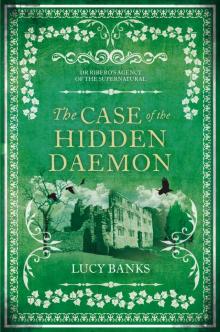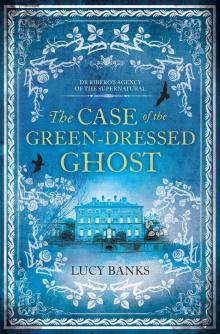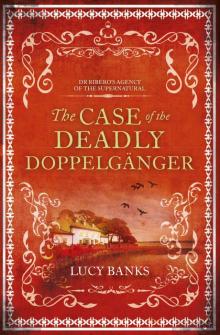- Home
- Lucy Banks
The Hanged Man and the Fortune Teller Page 13
The Hanged Man and the Fortune Teller Read online
Page 13
He frowns. “What, smashing windows? Vandalising property? No, I think it’s rather awful, to be honest.”
“I don’t mean that.” She pauses, casting her eyes back to the women, her eyes glittering momentarily in the sun. “I mean, fighting for equality. Wouldn’t you say it’s about time?”
He doesn’t answer. Another crash spills through the air, followed by more cheering. Glass peppers the street like raindrops. The ghost shakes his head. It is quite beyond his understanding why anyone would want to act so rashly, so violently. It is especially unnatural to see the gentler sex behaving in such a manner.
“That’ll show Mr Selfridge!” one lady bellows, hands waving in the air. “That’ll show all of ’em!”
Again, the women roar, leonine huntresses every one of them, baying for blood. Daisy cries out with the rest of them, and the ghost does not know whether to be awed or repulsed. These women are warriors, such as those he remembers reading about, long ago; those Amazonian females with spears in hand, war-cries crashing from their lips. He never imagined he’d see such a thing on the streets of London.
“I only wish I’d been that strong,” Agnes said wistfully, gliding down the street after them. “Things might have been different, then.”
No, they wouldn’t have, he thinks, remembering the viciousness of Ernst’s attacks. Even after several vodkas, he always managed to connect fist to face, never missing his mark. Had Agnes stood up to him, all she would have received was more beatings, perhaps worse. Ernst hadn’t been a man to rise up against, only to bow down before, like wheat beneath a scythe.
“What if her children see her?” He does not mean her own children, for Daisy doesn’t have any, or at least, not yet. Rather, he means the children she teaches at the local public school. There, the girls are educated in needlework, cooking, alongside rudimentary skills in writing and reading; which he believes far more suitable. They have separate gates, separate classrooms. It makes better sense, he thinks; and there is certainly none of this nonsense about equality.
He can tell Agnes is smirking, even though the brightness of the day dapples her, makes her more transparent than usual. “Isn’t it right that women start to challenge inequality?” she comments, pausing as another woman clambers on top of a wall, shouting yet another rousing speech to the masses. “If Daisy’s students witness this, perhaps it will be a good thing.”
“Or perhaps she’ll lose her position at the school,” he mutters.
“That would be a shame, she’s an excellent teacher.”
He concedes the point. Daisy has a way with children, a knack of focusing them, drawing their faces towards her like flowers to the sun. He and Agnes have often sat at the back of the classroom, listening to the screech of chalk, the clatter of wooden chairs, and Daisy Taylor’s voice, unfailingly cheery, rising above the childish chatter. Sometimes, the sound saddens him; reminding him of the children he never had. He wonders if he would have been a good father, whether his sons and daughters would have loved him. The devastation is in knowing that he will never get to find out.
Finally, the crowds disperse. Oxford Street is tattered, tugged apart; its usual milling shoppers still gawping in horror at all the glass, at the discarded rosettes and placards. The suffragettes have marked their territory, and the ghost senses things will never be the same again.
They follow Daisy back to her home, only a few doors from the ghost’s own house, which is now owned by a couple and their toddling, squalling child. He visits occasionally, simply to take in the ambiance of his former life; though it seems to dwindle daily, the essence of his life with Eleanor seeping out of the walls, like a gradual, final exhalation.
Daisy’s home is vital, perky, the mirror-image of its owner. Bright geraniums flank the porch, and the door knocker, an iron woodpecker, gleams in the sun. It is a house that the ghost approves of; well-kept, tidy, nothing within that is superfluous to requirements.
Daisy’s husband, Michael, places his newspaper down at the sight of his wife, then rises from the sofa. The ghost adopts his favoured position by the fireplace and waits patiently. He enjoys listening to them; their easy way of talking reminds him of times spent with Eleanor, and the similarity of their home to his own makes their conversation even more poignant.
“So, how did you get on, love?” Michael asks, smile already in place.
She sighs, unties her bonnet, then positions it neatly on the hat stand. “There was a good turnout, plenty of people there to make some impact. I was a little worried about the vandalism, though.”
Good, thinks the ghost, though at the time, Daisy hadn’t seemed concerned at all, cheering and waving her hands like the rest of them.
“Gosh, what sort of vandalism?”
Daisy shrugs, looking abashed. “I expect you’ll read about it in tomorrow’s papers. Some of the ladies were throwing rocks through the windows of the stores.”
“Good heavens, you didn’t say there would be anything like that! You could have been arrested!”
Agnes rolls her eyes, then settles beside the ghost, listening intently.
“Yes, but I wasn’t,” Daisy concludes, wandering to the kitchen. “And at least it’s a powerful message, don’t you think? It’s what we need to make people sit up and listen.”
Michael sighs, and the ghost pities him. He can sense the man’s concern, his panic that his wife has got herself into something larger, darker and more troublesome than she initially thought. He loves her so much, he realises, feeling the familiar warmth spread over him. So much, that he’ll support her in this, even though he has his doubts.
“What if someone from school had seen you?”
“That’s what I said,” the ghost murmurs. Agnes smiles, following Michael through to the kitchen.
“Yes, but nobody did.” Daisy places her hands around Michael’s waist, and pulls him towards her. It’s a little like watching a tugboat bringing a larger ship to harbour, but Michael doesn’t protest, instead, allows himself to be eased along, until he’s entwined in her arms. “So, it was perfectly fine, you see?”
He nuzzles into her neck, breathing in the scent of her. The ghost eases, recollecting similar moments in his past; a stolen kiss on a bared shoulder, fingers laced around a narrow waist. It all seems frighteningly distant now, the memories slipping into one another like eels, forming tangled, impenetrable knots. He guessed that his living days would start to slide away from him, but hadn’t realised it would happen so swiftly.
“Do you think we should retreat somewhere else?” Agnes suggests, nodding to the couple.
“Yes.” The ghost steals one more lingering look at the two of them, then nods. Propriety insists that they give Daisy and Michael the privacy they deserve. Young love, he thinks wistfully. It consumes all, like floodwater.
The thought makes him shiver. He freezes, taking a moment to calm himself.
“Are you all right?” Agnes pauses, noting his discomfort.
“Yes, I’m fine.” And he finds that he is; the moment gone, almost as soon as it had arrived. Water, he thinks, as they pass out of the house. Why is it always water? Outside, the dreary length of the Thames rests before them, its surface sparkling in the sun; an open taunt to his dwindling memory.
The next day, they follow Daisy to her school, buried in the heart of Whitechapel. The area has changed, the ghost finds. The streets are cleaner, the alleyways less dark. He spies his old offices, the windows just the same as they had been in his time, though the nature of the business has changed. They belong to a publishing company now, judging by the smart sign next to the door.
It was partially this proximity to his workplace that drew them to Daisy in the first place. He and Agnes had spotted her, walking home from work, and been drawn to her energy, her restlessness, and the urgency of her desire for change. And the sadness within her, that magnet of pain that always seems to pull him. The loss of a child. Daisy does not talk of it, but he can sens
e it within her, caged deep inside, and he sympathises, remembering similar pain from his own past.
They’ve accompanied her to school many times, though the location still troubles him. He remembers that there used to be a yard here, Dutfield’s Yard, where wheelmakers worked; and that something terrible occurred, something he had seen, though he doesn’t recollect the details.
Sometimes, it feels more like a half-remembered dream. A woman, face down on the cobblestones, blood puddling around her head like treacle. It had been dark, he can remember that much. And a man had sidled away from the scene, skipping from shadow to shadow like a spectre. He believes that he witnessed this in the early days of his ghost existence, shortly after his own passing, though he cannot say for certain. Things had been confusing back then, which is why he suspects that he cannot remember properly. Perhaps it will come back to me one day, he thinks, as they approach the school, the innocuous, turreted building, with seemingly no knowledge of what once happened on its grounds.
The school gates are shut, it’s still early. Daisy slips silently through the side entrance, nodding at the caretaker, who lets her into the building. The hallway is lofty, cool, the dust-covered windows filtering soft sunlight to the floor. She doesn’t notice, only paces to her classroom, shoes clipping against the tiled floor, as she does every day of the week. They drift after her, sensing already that this day will be different. The air is thick with anticipation.
The cough that interrupts her from her thoughts echoes flatly from the walls. Daisy turns. The ghost and Agnes turn too, already knowing that fate is wheeling into motion.
“Ah, Mrs Taylor, might I have a word, please?”
Daisy’s anxiety is palpable, even before she detects where the voice is coming from.
“It’s the headmaster,” Agnes comments, pointing to the open door.
The man’s balding head gleams dully in the light. Personally, the ghost cannot understand how he rose to such a lofty position; his slope-shouldered, flabby physique seems incapable of representing authority. He casts a feeble shadow on the floor.
“Yes, headmaster, can I help?” Daisy’s voice sounds reedy, mouse-like in the long, cavernous hall.
“In my office, if you please.” He nods inside. “This won’t take long.”
Agnes glances at the ghost, and he can tell they are thinking the same thing. Yesterday’s suffragette march. He knows.
The office is suitably academic in nature; walls lined with leather-bound books, the desk outfitted with a variety of important documents and pens. Behind it all, the headmaster seems swamped, a short, squinting figure dwarfed by the furniture of those who owned them before him. He waits, fingers laced, while Daisy perches on the only other available chair.
“Mrs Taylor, there’s something I’d like to discuss with you privately. Something quite urgent.”
She squirms. The ghost can tell her thoughts are running along the same lines as theirs; that same panicked voice chanting he knows, he knows, he knows.
“Yes, of course. What is it?”
The headmaster pauses, then rubs the side of his nose. “It’s a rather sensitive issue.”
The ghost can see Daisy steeling herself. It is etched in the tautening of her muscles, the straightening in her spine. She is waiting for the inevitable dismissal, the ghost thinks, and despite his reservations about her actions yesterday, he pities her anguish. She is good at her job, he wishes he could shout. Don’t let this one incident stop her from teaching.
“You see,” the headmaster continues, oblivious to the woman’s growing panic, right before his eyes, “it’s about a benefactor of ours. Or rather, I should say, his son.”
“Oh?” Daisy’s relief is palpable, filling the room like warm air.
“Yes. A very generous local benefactor, you may be aware of him, Mr Arthur Dinnock?”
“I’ve heard of Arthur Dinnock, sir.”
And so have I, the ghost thinks, reeling backwards. Agnes grasps him, motioning for him to listen.
“Yes, I rather thought you might have.” The headmaster clears his throat, then rifles through some papers on his desk, more to keep his hands busy than for any practical purpose.
“He’s referring to my brother,” the ghost hisses, incredulous. “Arthur, that’s my brother, do you see?”
“Yes, I know the name of your brother,” Agnes answers patiently. “Listen, in case we miss anything.”
Arthur, the ghost thinks, gazing in wonder around the room. It must be. How many other Arthur Dinnocks live around here? He wonders how old his brother must be; late forties, perhaps over fifty? It seems incomprehensible that his younger, easy-going brother should be so aged. I remember Mother being forty, he thinks. Arthur cannot be older than that, it simply isn’t permissible.
“Anyway,” the headmaster continues, placing the papers neatly down again. “Mr Dinnock has requested that we find some form of employment for his only son. Confidentially speaking, Mr Dinnock’s son is something of a gadabout, rather an embarrassment to the family from what I can tell.”
“What has this got to do with the school?”
“Our benefactor believes that his son might benefit from undertaking some teaching. Give him a role in life, you know the sort of thing.”
Daisy eases back in her seat. The ghost can already see her mind at work, grasping the possible outcomes with lightning quickness. He respects her intelligence. “I see,” she says slowly. “So what do you need me to assist with?”
“I’m glad you asked.” The headmaster leans forward, keen to come to the heart of the matter. “I would like you to work with him initially, let him observe your lessons, so he might pick up the ropes, as it were. Your class are the youngest, which will be easiest for him to start with.”
“Wouldn’t it be better for him to observe Mr Faircott, with the first-year boys?”
“For some reason, his father has specifically requested that George learn the trade with a woman, not a man. I have no idea why, perhaps he feels your gentler approach might be better suited to him.”
My nephew, coming into school to train to be a teacher? The ghost stares at the desk, overcome with a succession of questions, all competing for precedence in his head. Arthur’s child is a gadabout? I’m going to be able to see my nephew?
“You know it might not be the same Arthur, don’t you?” Agnes says, floating back towards the wall. “It might be an entirely different person, just with the same name.”
“I doubt it.” The ghost doesn’t believe in intuition, but nonetheless, there is a firm knowledge within him that his brother is the person in question. Perhaps it is fate, he wonders, then shakes his head. He’s always avoided such superstitious notions, left them instead to Eleanor, who was rather involved in such things.
“Will that be all?” Daisy stands, smoothing down her skirt.
“Yes, thank you, Mrs Taylor. You can expect George Dinnock today, at the start of class.”
“Today?”
“Yes, his father wishes for him to make a prompt start. He believes it will be character-building.”
The ghost’s emotions leap, somewhere where he once had a heart. George, he thinks, with something close to ecstasy. He remembers the name, knows that he’s already seen the boy before, when he was younger. What was he like? Loosely formed memories spring to mind; a short, dark-haired boy, trimmed collar peeping over a buttoned jacket. A baby, gurgling in a cot.
“Do you remember George?” Agnes asks, curious, as they follow Daisy out of the office.
“I believe so.” He catches sight of her eye, then hastily amends his words. “Yes, I think I do.”
“So, you’ll recognise him, perhaps?”
The ghost ponders. He doubts that his memory is good enough to match the child George with his adult counterpart, but suspects some feeling within him will guide him. I’ll know if he’s a relation of mine, he thinks, excitement rising within him. I’ll be able to feel i
t. “I think I will know him,” he answers, smiling.
Daisy looks less happy at the prospect, but her relief is still evident as she heads towards her classroom, grateful that her position is safe for now. The ghost waits at the back of the class, watching as she arranges chairs, checks her books, makes sure she has enough chalk for the board; and all the time, he wonders what his nephew will be like now, if indeed it is him. The word gadabout lingers, like a hint of bad odour. Why would any member of his family be a gadabout? Arthur had a good work ethic, so good that he managed to make himself a wealthy man. How could his son possibly be the opposite?
Outside, the dim rumble of children’s chatter starts to grow, swelling into a crescendo of noise. The bell is rung. Daisy sighs, smooths down her bun, then opens the classroom door, ready to greet her pupils.
The ghost always enjoys this moment, the tidal wave of youth, crashing into the room, tossed and turned by their own exuberance. He’s even begun to remember some of their names; Jane, with the two tightly pulled plaits, Nancy, with cheeks as red as strawberries, Ada, who looks rather feline, with her long face and aloof expression. They surge to their seats, a sea of heads, all focused on their teacher.
“It’s a shame they don’t get to learn what the boys are learning,” Agnes comments mildly.
“Don’t start with that again,” the ghost replies, with a hint of a smile. “You’re as bad as Daisy.”
“Good morning, class,” Daisy begins, eyes alight with pleasure.
“Good morning, Mrs Taylor…” They falter, confused, as a man steps into the door. His panting is so loud, it reaches over the girls’ whispering.
“Gosh, I’m late, aren’t I? It was that damned cab, I told the driver to head to Berner Street, and…”
Daisy steps forward smoothly, hand extended; more to quieten him than greet him, perhaps. “You must be George Dinnock? Do come in, I was—”
“I know, I know, I’m frightfully sorry at being late, I…” the man falters, as though only just noticing the numerous eyes, fixed upon him with open interest. He straightens his boater, then grins. “Hello there, everyone.”

 The Case of the Hidden Daemon
The Case of the Hidden Daemon The Hanged Man and the Fortune Teller
The Hanged Man and the Fortune Teller The Case of the Green-Dressed Ghost
The Case of the Green-Dressed Ghost The Case of the Deadly Doppelgänger
The Case of the Deadly Doppelgänger